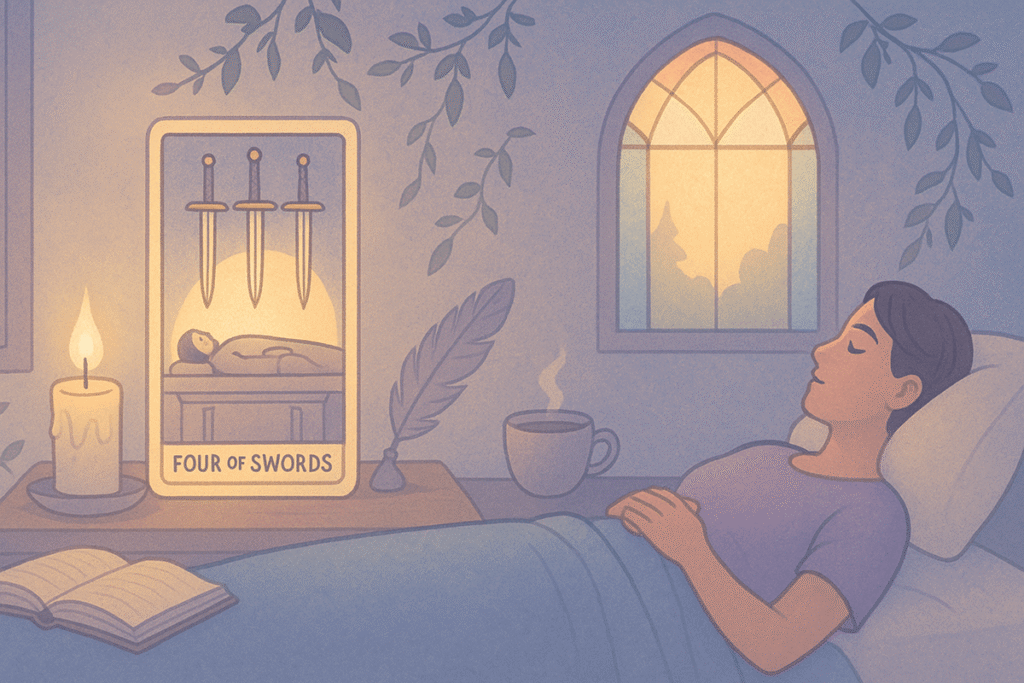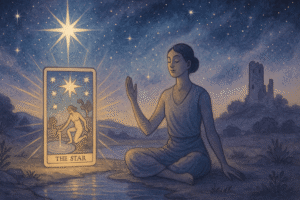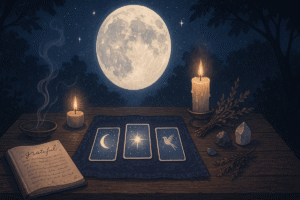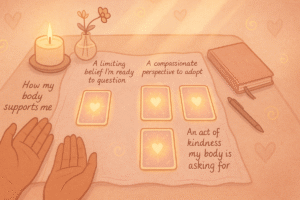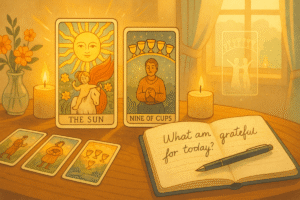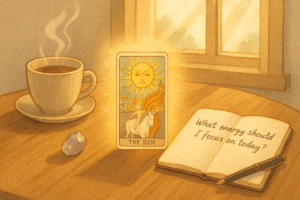Table of Contents
When I first encountered the Four of Swords in a reading, I’ll admit I felt a little disappointed. Where was the action? The drama? The clear forward momentum I was hoping for? The image shows a figure lying in repose, sometimes depicted on a tomb or in a chapel, with three swords mounted on the wall and one beneath them. It felt static. Unexciting, even.
But perhaps that initial resistance was exactly the point. We live in a culture that glorifies the hustle, that measures worth by productivity, that treats rest as something we have to earn rather than a fundamental human need. The Four of Swords doesn’t apologize for its stillness. It doesn’t dress up rest as something more palatable or productive. It simply is.
Understanding the Symbolism
The imagery of this card carries weight that becomes clearer the longer you sit with it. That prone figure isn’t dead, though the setting might suggest a funeral. They’re resting with intention. The chapel or sanctuary setting suggests sacred space, somewhere protected from the demands of the outside world. Those three swords on the wall? They represent the conflicts, the mental battles, the endless noise we’ve temporarily set aside.
What strikes me most is the fourth sword, the one positioned beneath the figure. It’s still present. The card doesn’t suggest we abandon our struggles entirely or pretend our challenges don’t exist. Instead, it asks us to create deliberate distance. To step back. To allow the mind and body the recovery time they desperately need before we pick up those swords again.
The stained glass window often depicted in traditional versions adds another layer. It hints at the spiritual dimension of rest, the idea that pausing isn’t just physical recuperation but also a reconnection with something deeper within ourselves. When was the last time you gave yourself permission to simply be still without an agenda attached to that stillness?
The Tyranny of Always Being On
Our devices ping at all hours. Email notifications arrive during dinner. Work messages appear on weekends. Social media presents an endless scroll of other people’s highlight reels, subtly suggesting we should be doing more, achieving more, becoming more. The boundaries between work and personal life have become so porous they barely exist for many of us.
I think about the way we talk about rest in modern language. We “crash” after periods of overwork, as if our bodies are malfunctioning machines rather than organisms with natural rhythms. We “recharge,” borrowing language from our phones and laptops. Even our metaphors betray how we’ve internalized the idea that we’re meant to operate like devices rather than living beings.
The Four of Swords appears in our lives as a quiet rebellion against this relentless pace. It suggests that there’s wisdom in withdrawal, that strategic retreat isn’t the same as giving up. Sometimes the most productive thing we can do is absolutely nothing at all. That probably sounds countercultural because it is.
Creating Your Own Sanctuary
Where in your life could you carve out space for this kind of intentional pause? The card’s chapel setting reminds us that rest works best when it’s protected, when we create actual boundaries around it. This doesn’t necessarily mean a physical location, though that can certainly help. It’s more about the quality of the space we create.
Maybe your sanctuary is the first hour of the morning before anyone else wakes up. Perhaps it’s a corner of your home where you’ve established a firm no-phone rule. It could be a weekly commitment to yourself that takes priority over other demands. The specific form matters less than the function it serves as a place where you’re genuinely off duty.
I’ve noticed that many of us struggle with this because rest without purpose feels indulgent. We can rest if we’re sick, if we’ve earned it through exhausting ourselves first, if we’re simultaneously being “productive” by listening to educational podcasts or reading self-improvement books. But what about rest for its own sake? What about pausing simply because we’re human and humans need to pause?
The Four of Swords gives us permission we shouldn’t need but often do. It validates the need to step away from the battlefield of daily life, to lower our defenses, to stop performing even for ourselves.
Mental Recovery and Contemplation
This card speaks particularly powerfully to mental and emotional exhaustion. Physical tiredness is easier to recognize and justify. But that peculiar weariness that comes from too many decisions, too much information, too many competing demands on our attention? That’s harder to name and even harder to address.
Contemplation requires spaciousness. Our thoughts need room to settle, like sediment in disturbed water gradually finding its way to the bottom. When we’re constantly stimulated, constantly responding, constantly moving from one thing to the next, we never give our minds that settling time. Ideas remain murky. Emotions stay jumbled. We lose track of what we actually think versus what we’re supposed to think.
The Four of Swords suggests that insight emerges from stillness, not from more input. What would it feel like to spend time with your own thoughts without immediately reaching for a distraction? What might you discover about yourself in those quiet moments? These aren’t comfortable questions, which is perhaps why we avoid the very pauses that might help us answer them.
Reflection Prompts for Deeper Understanding
Sit with these questions without rushing to answer them. Let them work on you gradually, the way the Four of Swords itself works through patient withdrawal rather than immediate action.
Where in your life are you most desperately avoiding rest? What are you afraid might happen if you actually stopped?
Think about a time when you were forced to pause, whether through illness, circumstance, or external events. What did you learn during that period that you couldn’t have learned while in motion?
What does your ideal sanctuary look like? What would make you feel truly safe enough to lower your guard completely?
How do you distinguish between productive rest and avoidance? Is there even a meaningful difference, or is that judgment itself part of the problem?
When you imagine yourself in the position of the figure on the Four of Swords card, what feelings arise? Relief? Anxiety? Boredom? Whatever comes up is information worth examining.
The Paradox of Productive Pause
Here’s something that feels contradictory but holds truth. The Four of Swords doesn’t promise that rest will make you better at your work, though it might. It doesn’t guarantee you’ll return with fresh insights or renewed energy, though you may. The card’s wisdom isn’t instrumental. It’s not about rest as a tool for future productivity.
And yet, we often discover that the pauses we resist most are the ones we need most desperately. When we finally allow ourselves to stop, genuinely stop, clarity often follows. Not because we were trying to achieve clarity, but because we created the conditions where it could naturally emerge.
This is the paradox. Rest works best when we don’t burden it with expectations. The moment we turn it into another task, another item to optimize and measure, we’ve lost the essential quality that makes it restorative.
Recognizing When the Four of Swords Calls
How do you know when this energy is needed in your life? Your body usually tells you before your mind catches up. Persistent fatigue that sleep doesn’t fix. Difficulty concentrating. A sense of being overwhelmed by previously manageable tasks. Increased irritability or emotional reactivity. These are signals, not character flaws.
The card might appear in a reading when you’re pushing too hard, burning through resources you don’t actually have. It might show up when you’re recovering from illness or grief or any significant life transition. Sometimes it emerges when we’ve been in crisis mode for so long that we’ve forgotten there’s any other way to exist.
What’s your relationship with rest right now? Be honest. Do you schedule it reluctantly, like an appointment with the dentist? Do you view it as a reward for adequate suffering? Do you feel guilty the entire time you’re supposed to be relaxing? The Four of Swords invites us to examine these patterns without judgment, though that’s admittedly easier said than done.
Integration and Moving Forward
Eventually, we do need to pick up those swords again. The Four of Swords isn’t suggesting permanent retreat from life’s challenges. It’s advocating for strategic withdrawal, for recovery periods that allow us to engage more sustainably over the long term.
Think of it as the breath between notes in music. Without that space, there’s no rhythm, no meaning, just noise. The pause is what gives structure to everything else. When we skip the rest periods, we’re not being more efficient. We’re degrading the quality of everything we do.
As you move forward from here, what would it look like to build regular pauses into your life rather than waiting until you’re completely depleted? How might you create those sanctuary moments before they become desperate necessities? These are ongoing questions, not ones with neat final answers.
The Four of Swords offers a radical premise that rest itself is sacred, that doing nothing in particular can be the most important thing we do. In a world that constantly demands more, this card whispers that sometimes enough is simply enough. What might change if you actually believed that?
Frequently Asked Questions
Is the Four of Swords telling me to avoid my responsibilities?
No, this card distinguishes between strategic rest for recovery and avoidance. True rest prepares you to return with renewed strength, while hiding from challenges keeps you stuck. The card asks you to check in with yourself honestly about whether you’re genuinely recovering or using rest as an escape from necessary action.
How long should I rest when the Four of Swords appears?
There’s no fixed timeline because rest needs vary by person and situation. The card suggests taking whatever time you need to regain strength and clarity before facing your next challenge. Listen to your body and mind rather than imposing arbitrary deadlines. You’ll know when you’re ready to reengage.
Does this card mean I’m experiencing burnout?
The Four of Swords can appear as a warning before burnout sets in, urging you to rest now, or it can indicate you’re already in a state of exhaustion requiring immediate withdrawal. If you’re pushing past clear signals from your body and mind, or if you’re experiencing overwhelming anxiety and restlessness, the card is highlighting a critical need to prioritize self care before things escalate further.
Can I still be productive while honoring the Four of Swords energy?
The card specifically encourages activities like meditation, journaling, decluttering your environment, or taking walks in nature—gentle practices that promote mental rejuvenation without demanding output. The key is choosing restorative activities that don’t add to your stress load. Productivity during this time looks like tending to your wellbeing, not achieving external goals.

